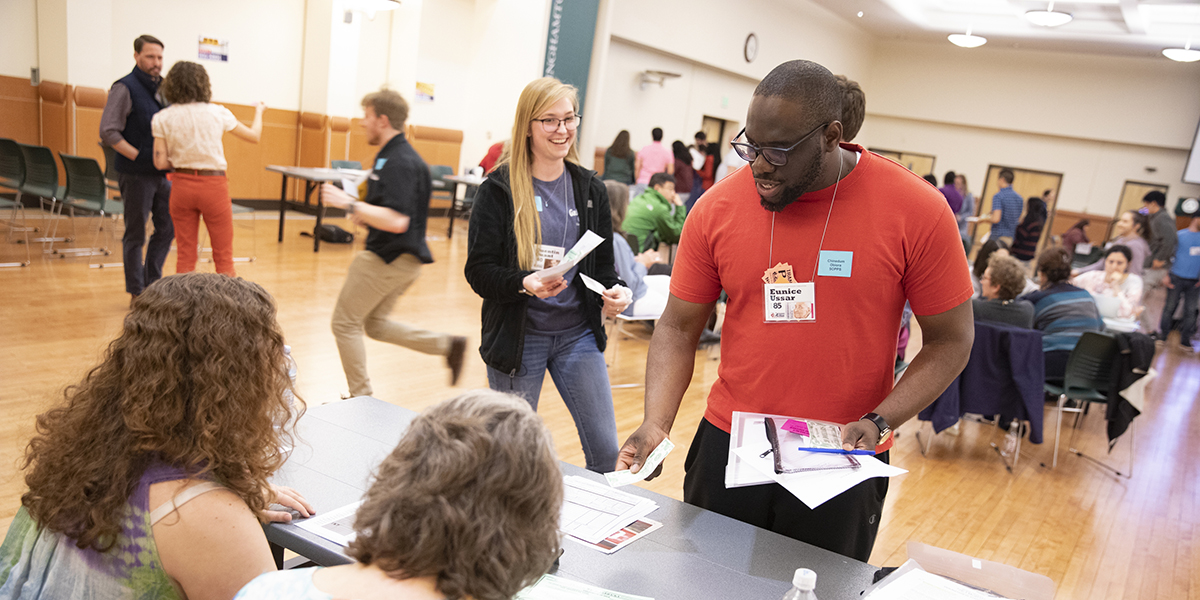Interprofessional education in a virtual world
Rethinking roles makes all the difference

Interprofessional Education (IPE) is a cornerstone of the curriculum for Binghamton University School of Pharmacy and Pharmaceutical Sciences PharmD students as they come together with nursing and Master of Public Health students from Decker College of Nursing and Health Sciences as well as Master of Social Work students from the College of Community and Public Affairs. Together, these students learn to become part of a healthcare team.
Knowing how to work on healthcare teams with other providers has become critical to the role of today’s pharmacist, and, after four years of offering IPE experiences to Binghamton students, they’re “going better than ever and are part of our culture,” said Erin Pauling, assistant professor of pharmacy practice and a member of the IPE instructional team.
But how does one pull about 270 students into teams of different disciplines during a pandemic when social distancing is the norm? With a lot of work and rethinking of individual roles, Pauling said. “We overhauled the way we did orientation this year into a virtual format, with three main themes and a focus on talking about teamwork,” she said. “It really improved the teamwork of the faculty because we subdivided into teams ourselves to work through the process.
“There seemed to be a really good sense of ownership of the material and students being very excited for what was to come in their IPE at orientation,” Pauling said. “It seemed to hit you in the heart and head and you could palpate that sense across everybody.”
Nina Flanagan, IPE director and a clinical professor in Decker College, said the IPE team did a remarkable job figuring out how to switch to a virtual format, starting with orientation. “We broke up into our own teams with themes and presented in a Zoom format and the students loved it,” she said. “The team came up with the format and how to make that transition being thoughtful and creative in a way that students are really liking.”
“It required us to reexamine ourselves and our individual strengths,” Pauling added. “We harnessed peoples’ skills in a different way so they would work on the assignments in myCourses if they weren’t tech savvy, for example. As teachers, we became the students and had to practice what we preach.”
And it seemed to go better than ever for the students, Pauling added. Student reaction was positive and they even indicated they would like more time in breakout sessions.
Luis Midence, who has already earned three degrees from Binghamton — his bachelor’s degree in biochemistry and master’s degrees in biological sciences and public health ¬— has a unique perspective because he went through the IPE curriculum in person as an MPH student, and is now experiencing it virtually as a PharmD student.
“Initially, when I first started the pharmacy program, I thought my virtual IPE experience was going to be worse,” Midence said. “The in-person experience was so interactive with a couple hundred young professionals. But, to be honest, with the transition to remote, it’s still an interdisciplinary approach and I’m still exposed to the other fields and disciplines, so it’s still very valuable and necessary because patient care relies on interdisciplinary teams.”
Midence said he’s learned some new things in the online format, and there’s an added benefit he and other students receive from the virtual program. “With telehealth so important in healthcare now, we should be comfortable in situations like this. Electronic communication is such a standard in our fields.”
Students participated in orientation and a healthcare delivery insurance project in the fall semester. The spring IPE course is on communications and culminates in a simulation demonstrating the struggles those living in poverty experience at the end of the semester. Last year’s Awesome Race was a competition among the student teams but this year the competition/race aspect has been removed.
“Instead, we had the students create visual vision boards,” she said. “Every team had a single slide to populate with words and images. Our goal was to have them get to know each other, on both personal and professional levels, about what they should and would bring to the table.”
Students were asked to consider the four overarching themes for IPE and highlight what their individual team has the most strengths in, and to consider their values as well. “We weren’t sure how it was going to go,” Pauling said, “but they were amazing and put together in 15-20 minutes. What was surprising was that there was very little overlap from one group to the next of what images and words were put together.
“And we did it in Google slides so the faculty could see what the students were doing in real time,” she added. “It helped us progress the event and the students actually dedicated the allotted time to it instead of rushing through to get done.
“We’ve been doing IPE for some time, but it feels that we are really now at the point of having that type of culture,” Pauling said. “We can nurture and hone it moving forward, and it’s not just students doing it because they have to.”
The IPE team is already planning for orientation and IPE courses for next fall, and will continue with the virtual format Flanagan said. “We’ve decided to keep our same teams; it works and will be less of an endeavor this time. The orientation program last year captured the passion of our IPE team and we saw in student evaluations they felt it and wanted more.”
